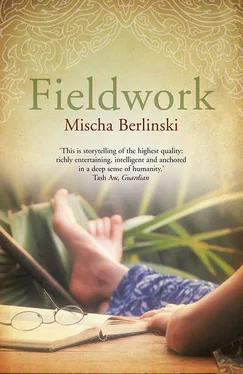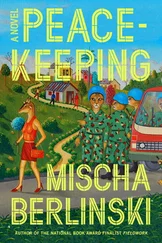We had been in Pak Nai for about two days when I conceived the idea that we move there.
"No, I'm serious," I said. "We could stay. I'd sell an article every couple of months, we'd be fine. We could have kids here, they'd grow up speaking perfect Thai and swim like fish."
"When they got to be teenagers, we'd just build them a houseboat of their own, because they'd be such pests," Rachel said.
"Exactly."
I should have left things there, but the more I thought about the idea of living in Pak Nai forever, the more excited I became; it was something about Martiya's letters that made it seem like a swell idea. Another day passed, and I presented the idea to Rachel again.
"Seriously, why couldn't we stay here?"
"Because we'd go out of our minds after about two weeks? Because my family lives ten thousand miles from here? Because your family lives twelve thousand miles from here? Because there's not even a telephone here? Because we wouldn't have jobs? Because we wouldn't have money?"
"But we'd have a great time. We'd learn terrific Thai, we'd really, really figure these people out, not like in Chiang Mai."
"I don't want to spend my life floating."
"Rachel," I said, "I've thought it over and we really should move to Pak Nai."
She gave me that look that women give men when they want to have a serious discussion. She said, "I don't want to move to Pak Nai. I'm twenty-eight years old, and before long, I want to marry and have children. Then I want to raise my children in a normal house, not far from their grandparents. Do you want these things? Because I do, and they're not going to happen in a floating bamboo hut."
That's when I dived into the water to forestall further discussion. I didn't mention my plan to live in Pak Nai again. By the time we went back to Chiang Mai, I was sunburned and thoroughly sick of the place, anyway: there wasn't anything to eat there but fish, and I was dying to check my e-mail. I thought that maybe one of the Walkers had written to me, or Karen Leon. Maybe she'd found more letters from Martiya.
ABOUT FIVE MONTHSafter her arrival in a Dyalo village, Martiya, in a letter to Karen Leon, admitted something dark and terrible — that she was beginning to feel a little like Eskimo Kathy. She was referring to a story told and retold in the Berkeley Department of Anthropology. "You know about Eskimo Kathy, don't you?" the grad students had asked each other; Kathy, the grad students whispered, was just like us once, before she went off to study the Eskimo.
The story went like this. Kathy was a delicate little thing, hardly bigger than a child, who had dreamed of living with the Eskimo since the fifth grade, when she wrote a report entitled "People of the Snow" for social studies. When Kathy went off to realize her long-standing dream, she chose the most isolated, northern Eskimo village she could find, where the Eskimos still lived as Eskimos. There she explained to the Eskimo chief that she was just a child in the ways of the Eskimo and finagled herself an invitation to share his family's igloo for the winter. She settled in; the sun went down, not to return until the spring; the last boat left until the warm weather would liberate icebound Eskimoland; and Kathy discovered that she didn't like her Eskimo family. It was as simple as that, really. Some human beings just don't like each other. The Eskimos yammered about the stupidest things, and they would not stop yammering. The Eskimo had four hundred words for snow because it was all they ever talked about . Nobody had ever told Kathy that an igloo was so tiny, and the Eskimo chief smacked his lips maddeningly as he ate his boiled fox and seal blubber stew. And what was worse, Kathy overheard the wife of the Eskimo chief admit to her sister that they did not like the clumsy, ugly kapluna either. "She is so stupid!" the Eskimo chief's wife said. That really rankled, after Kathy had spent all those hours building rapport with the chief's wife by patiently learning to sew real Eskimo muqluq s. Kathy had thought her muqluq s were very nice. She didn't think she was stupid. She thought, Let the Eskimo chief's wife try taking the GRE.
There were seven months of subzero temperatures still to come, and outside the igloo's tiny port, absolute Arctic darkness. Dark daybreaks yielded up dark mornings; it was dark at midday and the afternoon was dark, too; she took her afternoon tea in darkness, and then what was dusk to the south was here just more — darkness; dark twilights preceded dark evenings; and then the nights were very, very dark. Kathy became desperate, and she hit on a plan: she would have the Eskimo make her a little igloo of her own. She would decorate it just the way she liked, and she'd cook her seal blubber outdoors even if it was really cold, so the igloo would never smell bad. She began to dream about her igloo at night. But her proposal only made things worse, as her Eskimo host refused her very reasonable idea. Nobody declines the hospitality of an Eskimo chief! She could sleep on the glacier like a seal, if she wasn't happy in his home! The offended Eskimo chief now refused even to speak to the anthropologist, and made a gesture so offensive that the anthropologist would not speak to him. It was only December. The graduate students never knew just what happened next. Kathy never talked about it. She came back to Berkeley the next spring only long enough to empty her apartment of its possessions. She chain-smoked, having run out of cigarettes in Eskimoland in mid-December, and muttered something about it being much, much colder in the North than everybody thought.
Isolated by her linguistic incompetence, often only mildly interested in the people, and increasingly plagued by a desire just to be alone , Martiya, after five months in a Dyalo village, began to dwell obsessively on Eskimo Kathy's story. Martiya arrived in Dan Loi believing that because of her childhood in a Pipikoro village, because she had been a curious and excited traveler, and because of her sensitivities to indigenous peoples as a student, she would find anthropological fieldwork easy; or if not easy, then compellingly interesting. She was wrong. It was not easy and only intermittently interesting. This discovery was a crushing blow to her ego: her father had warned her in his mild way before leaving that she might not find fieldwork wholly to her liking. Piers had said that the best fieldworkers were those with small, discreet, camouflaged personalities — people not entirely unlike Piers van der Leun himself— and Martiya was always a presence . "Daddy!" Martiya had said very loudly in the Brazilian café in Berkeley where they were eating lunch.
Now she feared that he might well have been right. The language was incomprehensible, and even after five months of total immersion she could not so much as ask for a glass of water and be understood. When her guide and translator, Vinai, repeated her questions in properly inflected Dyalo, she could not understand the responses. She was not certain, but it was her impression that the people of the village had begun to avoid her, or when they sought her out, it was to ask her for money. She had not expected that there would be quite so much mud. Everywhere Martiya went there was mud: the narrow path leading up and into the village was sludge, and the big road leading down to the highway was as slippery as a ski slope. There was mud in her hut, and dried mud on all of her clothes. The mud on the path between Martiya's hut and the communal kitchen was so thick it sucked off her shoe. Martiya had arrived in Dan Loi at the onset of the rainy season, and almost from the first the sun had disappeared behind the dark, menacing shroud of storm clouds which surrounded the village. There were mists and fogs and hazes and vapors, and when the rain wasn't pelting down from above, steam was rising from the rice paddies below. The monsoon that year was the heaviest in a generation: it rained and rained and rained and rained and rained and rained and rained and rained. The village was situated saddle-style on the back of a broken ridge high in the mountains, like all Dyalo villages, one half of the village facing west, the other east; but after three months in Dan Loi, Martiya had not yet once seen either sunset or sunrise, only at dawn and at dusk miasmic gray, through which Martiya and her Dyalo hosts passed like phantoms.
Читать дальше












